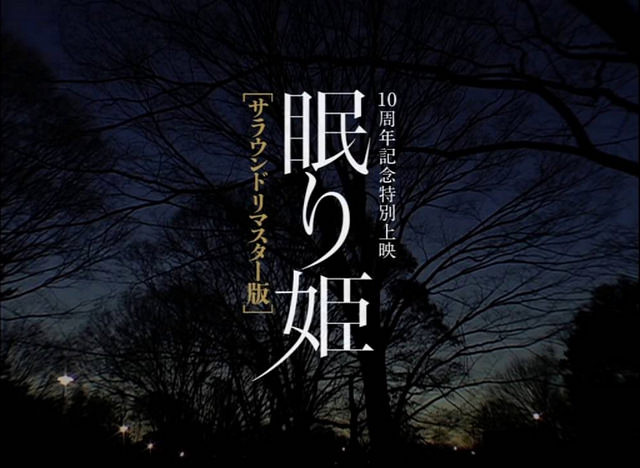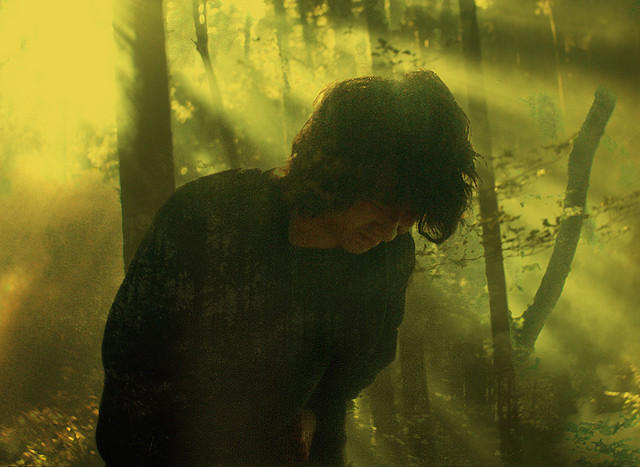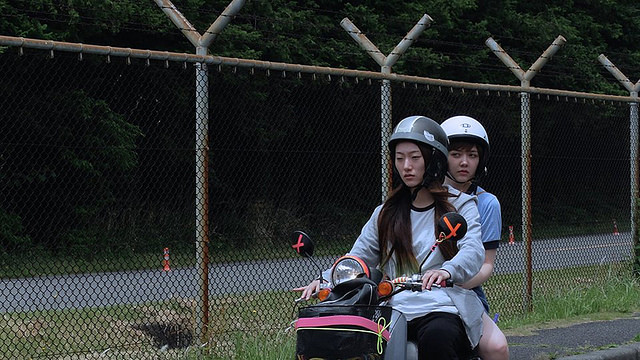Festivities start off with a bang on Thursday, July 13th, ushered in by special guest director and JAPAN CUTS veteran Yoshihiro Nakamura (Fish Story), who introduces the Opening Night Film MUMON: The Land of the Stealth, making its U.S. Premiere. Known for his masterful genre blenders, MUMON is Nakamura’s modern take on the traditional jidaigeki (period drama), full of fantastical ninja moves that uphold genre standards, yet imbued with a unique sense of eccentricity and playfulness. Director Nakamura appears in a post-screening Q&A, followed by a rollicking Opening Night Party held in Japan Society’s historic theater and waterfall atrium.
As previously announced, JAPAN CUTS is proud to present this year’s recipient of the CUT ABOVE Award for Outstanding Performance in Film to Joe Odagiri, the remarkably talented box office golden boy and matinee idol of Japan. Odagiri receives the award before the Centerpiece Presentation screening: the East Coast Premiere of Nobuhiro Yamashita’s critically acclaimed drama Over the Fence. A baseball themed Home Run Party follows the screening in celebration of the film and the performance that anchors it. Demonstrating the breadth of his talent and penchant for taking on difficult roles, Odagiri also participates in a Q&A following the U.S. Premiere screening of Kohei Oguri’s FOUJITA, about the life of the complex titular painter.
The festival's Closing Film offers a poignant and indelible deviation from traditional Japanese war dramas: Sunao Katabuchi’s In This Corner of the World, winner of the Japan Academy prize for Animation of the Year. A deeply moving coming-of-age story about a persevering young woman, In This Corner of the World captures civilian life under the catastrophic tide of World War II with a tone that is at once mournful, optimistic, and enchantingly heart-swelling. The film’s prolific producer (having previously worked on Patlabor, Satoshi Kon’s masterpieces, and many other titles) Taro Maki attends for the post-screening Q&A.
Here are some of the films I got to watch from the lineup. Please visit Japan Society website for tickets and more info.
ANTI-PORNO

Can Sono Sion, known for his crazy movies with ultra violence and upskirt photography, have a cake and eat it too, in tackling a subject like misogyny in Japanese society? In his Nikkatsu studio commissioned Roman Porno Revival, Anti-Porno, Sono goes for it with mixed results.
Tomite Ami is Kyoko, who wakes up in her primary colored loft, prances around naked. She is supposed to be a famous author, painter and all around creator. She has a somewhat of an emotionally/physically abusive sadomasochistic relationship with her middle aged, mousy assistant Noriko (Tsutsui Mariko). Kyoko's adoring entourage arrives for a photo shoot and she makes Noriko naked on all fours barking like a dog in chain. Suddenly, director calls cut and reveals that the loft is a movie set and the roles are reversed - Noriko is the dominant one and Kyoko is the submissive, self-doubting, all around much abused young ingénue playing (terribly, she is told) the dominant role in a movie. During the course of the movie, their roles change many times.
In multiple flashbacks, Kyoko grows up with her parents’ hypocrisy on sex - their puritanical education on morality didn't match their voracious sexual appetite. So she very much longed to be a whore in high school. But yet, she seems deeply confused about what it means to be a whore. She seems incapable of escaping from being 'a woman' in a male dominant Japanese society. It's a vicious cycle- being a whore equals free equals being a men's plaything.
In this meta movie-within-a-movie thing, Sono even tries to assert artistic superiority of roman porno over straight up porno: when high school student Kyoko auditions for a roman porno project, claiming she wants to be a whore, ripping her sailor school uniform off, the director scoffs at her, "This is roman porno. Do you even know what it means to be a whore?"
Satire is one thing, but Sono doesn't seem to get the spirit of the roman porno. To be honest, this Nikkatsu revival of the genre is as dated and tiresome as James Bond franchise. The revivals are supposed to be a harmless titillation with certain restrictions - no depiction of underage sex, etc. It is sad that in depicting sex act, Sono can only resort to sailor uniforms. The movie is hardly sexy or titillating. Sono falters when he tries to be serious. At the end, he just needs to cover up his muddy messages with bucket of colorful paints thrown all over his female protagonist. I like his comedies more.
ONCE UPON A DREAM

Just static images of quiet empty rooms, subway rides, cityscape at dusk consist Once Upon a Dream, a cult film that has been gathering followers over the years, including Kiyoshi Kurosawa who compared it to Jean-Luc Godard's. Indeed, the film's carefully composed exterior shots remind me of many of 80's Godard.
It tells a barely seen protagonist, a soft-spoken school teacher whose somnambulist existence and her weird demeanor are affecting her day to day life. We hear her thoughts in her voice over and her conversations with others, without us seeing anybody on screen. We hear the rustles of bed sheets, footsteps, breathing, moving of locomotives, idle, unintelligible conversations of others in the shops and cafes. Perhaps Once Upon a Dream is the most intimate eavesdropping film as opposed to the most voyeuristic.
Director Shichiri Kei, on the film's 10 years anniversary, added crisp new footage and redid sound design, giving this avant-garde classic a new life. The result is hushed contemplation of urban loneliness that is beautifully, uniquely realized visually and aurally. Quiet yet deeply affecting, Once Upon a Dream is a truly one of a kind experience.
HARUNEKO

It seems that people who want to die end up in a cafe in the middle of nowhere, deep in the forest. It is run by a young man known only as 'manager' with the help of an old woman who sits in a rocking chair, knitting, and a boy name Haru.
The glimpse of the lives of would be dead are projected on a make shift screen, followed by sing-along, accompanied by an indie rock group with a white papier-mâché of a cat on their heads. After that, they are driven through a tunnel of no return deep into the forest where they disappear slowly and become the part of soundscape in the air.
Misty forest settings are highly evocative. It recalls Tarkovsky and the idea of a station between two realms reminds me of Koreeda's affecting Afterlife. Strange and beautiful, Haruneko is a somber, haunting and highly ambitious whatsit that falters a little in its own preciousness.
YAMATO (CALIFORNIA)

Yamato, a city 35km south of Tokyo, hosts the largest US military base in Asia. A Yamato native director, Miyazaki Daisuke, tackles the influence US still has on its inhabitants in his indie feature, Yamato (California), and he has some pointy things to say about it. Sakura (Kan Kanae), plays a wayward high school dropout, first seen rapping in the city's garbage dump. She lives in a tiny house with her busy single mom and her nerdy brother. She works part-time at a traditional Japanese restaurant that serves grilled eels, but she spends most of her time alone practicing rap inside an abandoned van or tit-tatting with her brother over sharing a computer or their tiny living space (divided only by a curtain).
She hasn't quite found herself yet and her rebellion and thuggish attitude are not winning hearts and minds of her surroundings. In order to pursue her music career, she needs to get a computer and a smart phone. She finds out that there is a singing contest at a local cultural center with $2,000 US dollar prize.
Things get a little more interesting when Rei (Endo Nina), an American-Japanese daughter of mom's unseen American boyfriend comes to stay with them. At first, Sakura is downright hostile, but Rei's sunny disposition wins her over and they start hanging out. Sakura takes her to her drab local attractions - mostly shopping malls, cheap stores, the van and a rap music venue, which they get kicked out of, for being underage. They share beers and bad pizza. But Rei's insistence of hearing her rap pushes Sakura to re-evaluate her directions.
Yamato (California) treads the same path as Irie Yu's indie hit 8000 Miles trilogy in terms of disaffected youth with their shot at success theme. The interesting subtexts of US cultural dominance and the rise of jingoism are also there. It's also in the casting of Kan, a Japanese-Korean actress, playing downbeat young woman with cultural identity crisis.
There are so much potential in Yamato, especially with two beautiful, striking actresses- Kan who is very charismatic and has a good screen presence and Endo, a short haired gamine. I just wish Miyazaki concentrated more on the characters and details of their lives instead of awkward, obligatory actions that only serve to move the story forward and take up too much screen time.
No comments:
Post a Comment